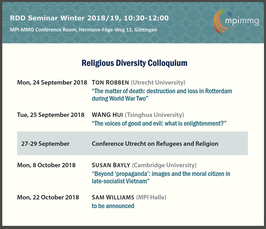"Beyond ‘propaganda’: images and the moral citizen in late-socialist Vietnam"
Religious Diversity Colloquium Winter 2018/19
- Date: Oct 8, 2018
- Time: 10:30 AM - 12:00 PM (Local Time Germany)
- Speaker: Susan Bayly (Cambridge University)
- Susan Bayly (M.A., Ph.D. University of Cambridge) is Professor of Historical Anthropology and Director of Graduate Education in the Cambridge University Department of Social Anthropology. She is a past editor of The Journal of the Royal Anthropological Institute and former Associate Editor of Cambridge Anthropology. She has held visiting appointments in the USA, India, France and Singapore. She is adviser to a number of museums and other institutions in Vietnam, including the Vietnam Centre for Research & Promotion of Cultural Heritage. Her publications include Asian Voices in a Postcolonial Age. Vietnam, India and Beyond (Cambridge University Press, 2007) and Caste, Society and Politics in India from the Eighteenth Century to the Modern Age (Cambridge University Press, 1999). Her current research is on aspects of marketisation experience in contemporary Vietnam, though she retains a longstanding interest in the Indian subcontinent. She recently completed a study of conceptions of achievement and success in contemporary Vietnam funded by the UK ESRC, and is currently combining the perspectives of visual anthropology and the anthropology of morality and ethics in a project on how official and personal images are deployed and perceived in variety of present-day Hanoi contexts.
- Location: MPI-MMG, Hermann-Föge-Weg 12, Göttingen
- Room: Conference Room

For more details please contact vdvoffice(at)mmg.mpg.de.
This lecture forges connections between two vibrant areas of current research: visual anthropology and the anthropology of morality and ethics. Its focus is on achieving moral citizenship as represented in Vietnam’s visually spectacular capital, Hanoi, and on images as active and morally compelling, not mere reflections of the challenges of late-socialist marketisation. The case of Vietnam compares intriguingly with other contexts where visuality has been fruitfully explored, including India and post-socialist Eurasia. The question asked is how images, both personal and official, can work either to provide or deny the viewer a quality of moral agency which they feel to be their due. The answer is found in the intertwining of silence and speech in relation to images. This includes what is said and unsaid in regard to public iconography, including memorial statuary and state message posters. It is also proposed that the visuality of the urban streetspace is a continuum involving significant interaction with the intimacies of home and family image use. And the article seeks to add to our methodological ideas about treating fieldwork photographs as a basis for interaction with interlocutors, hence as active research tools rather than mere adjuncts to observation and analysis.